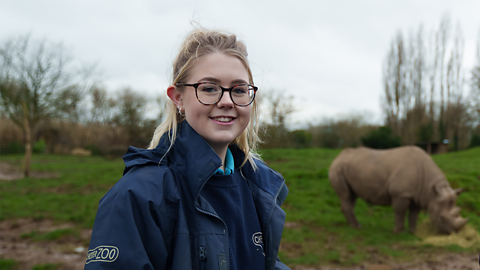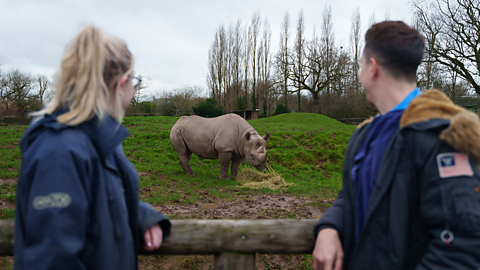Meet Charlotte, a zookeeper apprentice working at Chester Zoo. Part of our Bitesize apprenticeship series.
There is never a dull day, there's always something new or exciting happening!

Why did you choose to do an apprenticeship instead of further education?
For me, higher education was never really an option financially and despite gaining good grades throughout my education, classroom-based learning was never really my thing. By doing an apprenticeship I'm able to learn on the job while spending all my time outdoors, surrounded by incredible animals.
What are the benefits of doing an apprenticeship for your job role?
Experience is vital when looking to become a zookeeper. The apprenticeship provides a way of gaining this experience while learning on the job and getting paid to do so. You are able to gain skills and knowledge by working alongside keepers who have been in the industry for years.
What skills do you use?
Time management skills are essential when working in a fast-paced zoo environment. I have a keen eye for detail and good observational skills which are vital for recognising any problems within an enclosure, or changes in an animal's behaviour. Being able to use my initiative is key, as there is always another job to be done! Teamwork and good communication are really important, especially when working with animals as large as a rhino! Good communication skills are also vital for talking to and interacting with the public.

Is this the job you always wanted to do?
Yes, it sounds clich├® but from the age of around four or five I always used to tell people I was going to be a zookeeper. That dream never really went away and it's the career I've always wanted.
How would you describe your job?
Fast paced and always interesting, no two days are ever the same! There are a number of tasks that are completed every day regardless of the species, these tasks include: cleaning the animal's enclosure, where we remove all faeces as well as any uneaten food or produce from the day before. There is always lots of sweeping involved in being a keeper! Preparation of food, which can vary from weighing out specialist pellet or cutting up fruit and vegetables. We feed the animals and also complete visual health checks of them.
Why would you recommend your career to others?
Being a zookeeper is rewarding. You get the chance to work with incredible animals and you get to be a part of the breeding and conservation efforts that are helping to save the species from extinction. You get to form bonds and connections with individual animals. There is never a dull day, there's always something new or exciting happening!

Three top tips you've learned while working:
- If you have a question, donŌĆÖt be afraid to ask - there's no such thing as a silly question.
- Be prepared to work in all weathers, you will spend a lot of time outside getting wet in the rain.
- Always shovel poo with your mouth closed!

What to expect if you want to be a zookeeper
- Zookeeper average salary: ┬Ż14,000 to ┬Ż25,000
- Zookeeper typical working hours: 37 to 40 hours per week
What qualifications do you need to be a zookeeper?
You could get into this role via a university course, a college course (such as a Level 3 Diploma, an A-level in Biology or a T-level in Animal Care and Management - England-only, from Sept 2023), an apprenticeship, volunteering, or working towards the role by completing a Diploma in Management of Zoo and Aquarium Animals (DMZAA) if you're working in a zoo or aquarium.
Sources: LMI for All, National Careers Service,
This information is a guide and is constantly changing. Please check the for the latest information and all the qualifications needed and the for more on T-levels.
For careers advice in all parts of the UK visit: , , and .

Apprentice stories. collection
Find out about apprenticeships and a wide range of apprentice stories.

Jade: substation engineer apprentice
Jade is doing a Level 4 higher apprenticeship, training to become a substation engineer.

Aron: a rugby coach apprentice. video
Aron coaches young children how to play rugby and tries to increase participation in the sport across Wales.
